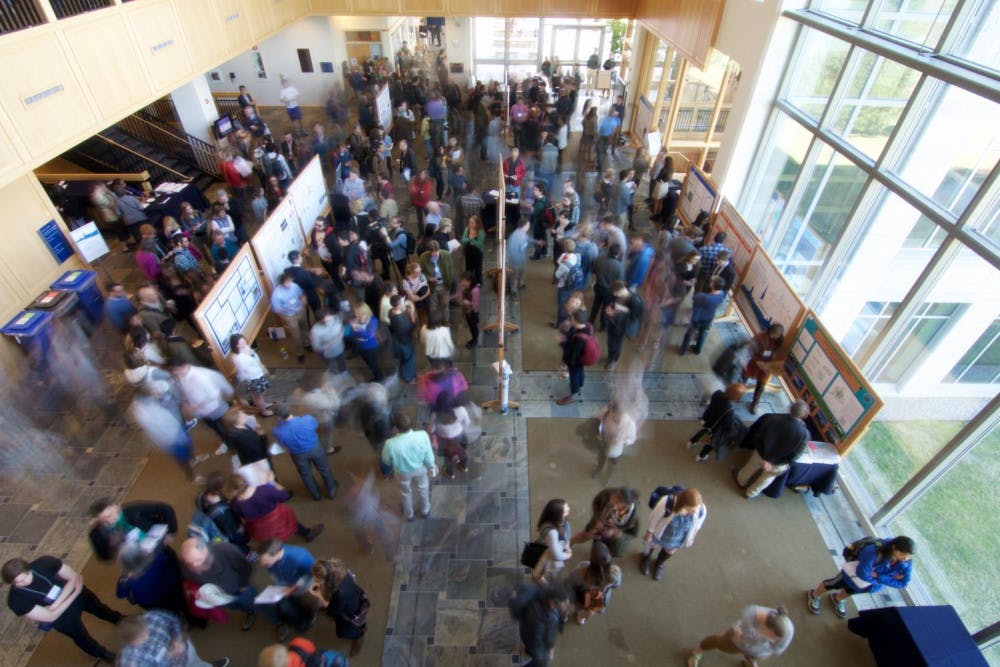With the Spring Student Symposium happening tomorrow, all of us here at The Campus cordially encourage you to embrace your inner nerd. This sort of academic initiative can take many forms. Maybe you attend a friend’s symposium presentation and discuss their work over dinner afterward. Maybe you go to a professor’s office hours and finally ask them about their independent research. Maybe you grab a meal with that one kid who always makes profound comments in class. At the end of the day, virtually any type of extracurricular academic engagement will be intellectually stimulating and provide you with unique perspectives on topics you may never have encountered.
The symposium is one of the few occasions where we can directly observe our peers’ work. Symposium presentations are amazing opportunities to expand your intellectual horizons and learn about topics beyond your specific major or coursework. You may also come across other like-minded students who share your interests and would be more than happy to continue academic discussions beyond the symposium. So, rather than wasting the entire day off, why not attend a few presentations and learn something new?
While we certainly encourage you to wholeheartedly embrace the Spring Symposium, we do not believe extracurricular intellectualism should stop there. Many of us on the editorial board have found that some of our most memorable and interesting discussions at the college have occurred in non-academic settings, and we encourage students to actively foster such discussions on campus as often as possible.
[pullquote speaker="" photo="" align="center" background="on" border="all" shadow="on"]Rather than wasting the entire day off, why not attend a few presentations and learn something new? [/pullquote]
We would thus like to propose a series of recommendations that may promote the academic spirit of the symposium throughout the school year. First, we believe the administration should revitalize the college’s tradition of professor-student lunches by allowing professors to get a select amount of meals with students for free. Talking with professors in non-academic settings not only enables students to solidify their understanding of in-class material, but also provides an opportunity to explore tangential subject matter that may have been overlooked by the course syllabus.
We also think more academic departments should hold additional coffee hours or lunches to foster scholarly discussions among students interested in similar topics. These events should be accessible to everyone regardless of individual majors to encourage a culture of academic curiosity where students willingly leave their intellectual comfort zones and engage with new material.
The pilot computer science language table is a great example of an academic department taking initiative to foster extracurricular discussions among interested students, and should thus act as an example for other departments moving forward. These extracurricular events could encompass everything from coffee hours to meeting up at a professor’s house for dinner, so long as they provide students with adequate platforms to engage in intellectual discussions.
Joining academic clubs on campus is yet another way to surround yourself with individuals who are more than willing to engage in intellectual discussion. These clubs are open to all students across all disciplines, and represent a perfect opportunity to embrace academic interests in low-stress extracurricular environments.
We also encourage students to reach out to classmates whom they may not know but who make interesting comments in class. If a fellow student shares an idea that surprises or intrigues you, ask them to lunch! Take advantage of the fact that you both share a similar academic interest and discuss subject matter related to your class; you may even make a new friend.
[pullquote speaker="" photo="" align="center" background="on" border="all" shadow="on"]Tomorrow’s Spring Student Symposium represents an amazing opportunity for us all to engage our intellectualism beyond the classroom.[/pullquote]
We also advocate for more professors to prioritize student participation in their classes over lectures. Many members of the editorial board believe in-class discussions provide more incentive to complete coursework and assigned readings ahead of time as a means to participate. When the professor simply regurgitates the contents of an assigned reading during class, students may feel less motivated to actually complete the readings themselves and may lack personal investment in the subject material as a result. As such, we think more discussion-based courses should be accessible to the general student body (rather than just upperclassmen) to encourage as much intellectual investment as possible throughout students’ academic careers.
We would also like more students to pursue their own academic endeavors outside of class. Whether this means creating an independent short film with a few friends or conducting independent research based on a historical topic covered in class, we believe these projects present valuable opportunities for students to take more initiative in their academic development throughout college.
The college’s Divestment Movement is a perfect example of students becoming inspired from their academic coursework and taking initiative outside of class to make a difference on campus. While not all extracurricular ventures need to have large institutional impacts on the college, we can all still appreciate the intellectualism that catalyzed the Divestment Movement and channel similar sentiments towards our own academic passions outside of class.
Additionally, the college should host more opportunities for students to intellectually engage with members of the local community. While it’s great that much of the college’s extracurricular intellectualism coincides with the invitation of outside speakers to campus, we should maintain these conversations year-round with the dynamic people who reside here in Middlebury. The white supremacy teach-in last month was an excellent example of facilitating discussion among the members of our community that should be emulated through future events.
Tomorrow’s Spring Student Symposium represents an amazing opportunity for us all to engage our intellectualism beyond the classroom, but why stop there? Why not make the most of these four years and meet new people, leave your comfort zone and learn something new?
A Call to Nerd Out

Comments



